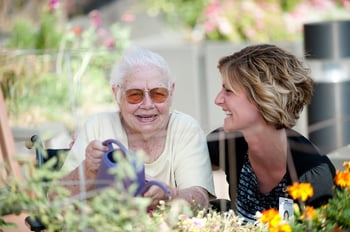Independent, Assisted, & Long-Term Care – What’s the Difference?
Elizabeth Meyer | Jul 14, 2015
There are many different styles of senior living communities available that offer different levels of health services, care, living amenities, and opportunities to enjoy life. When you begin navigating what’s out there and start considering what’s right for you, it is important to know the difference in living options and what they offer.
Independent living, assisted living, and long-term care are three popular senior living options that often get confused. Below we’ve broken down each option and explained what makes them unique …
What is Independent Living?
 Independent Living is a type of maintenance-free living that offers a relaxing lifestyle for older adults. Some are rental options and some are ownership options. Typically this style of living is ideal for older adults who require little to no assistance with activities or tasks associated with daily living. The key difference between independent living and other housing options is the level of assistance offered.
Independent Living is a type of maintenance-free living that offers a relaxing lifestyle for older adults. Some are rental options and some are ownership options. Typically this style of living is ideal for older adults who require little to no assistance with activities or tasks associated with daily living. The key difference between independent living and other housing options is the level of assistance offered.
Independent living has many different names: retirement community, 55+ communities, active adult living, senior housing, condominiums, cooperatives… the list goes on. Whichever name you give it, the purpose of independent living remains the same: to make the day-to-day lives of seniors easier.
Independent living allows older adults to live in maintenance-free communities, most often in comfortable apartments and in some cases, homes. Independent living gives seniors the opportunity to maintain an active and social lifestyle in a communal residence, while allowing them time and space for their own routine. Some of the main characteristics of Independent Living include:
- Optional health care services
- Engaging social activities
- Individual living spaces
- Prepared meals
- Safety
- Beautiful apartment homes
What some individuals don’t realize about living in this particular type of community is that it can lengthen one’s independence. How? If older adults embrace an independent living lifestyle and are able to enjoy the luxury of carefree housing and a positive, social atmosphere, it can have profound effects on their overall health. Don’t wait until you need assistance or care – embrace your independence with independent living.
What is Assisted Living?
Assisted living is designed for older adults who are no longer able to safely and healthily live on their own, but do not yet require an extremely high level of care. This style of living typically combines residential housing options, support services, health care, and other assistance as needed to provide seniors with a comfortable, uplifting environment to live in.
Those who live in an assisted living community can take advantage of 24/7 on-site healthcare services such as health monitoring and medication management. Here, older adults no longer feel as though they are a burden to others, but feel safe and supported and have the opportunity to participate in an active and healthy day-to-day routine.
.jpg?width=350&name=20120127_wm_412%20(1).jpg) Like independent living, assisted living is very conducive to maintaining an active lifestyle but is maintenance-free. Some assisted living communities specialize in memory care, providing neighborhoods designed for safety and staff that have been uniquely trained to serve those with memory loss. Assisted living allows seniors to remain as active as possible while receiving the health and medical support they need. Assisted living communities can offer:
Like independent living, assisted living is very conducive to maintaining an active lifestyle but is maintenance-free. Some assisted living communities specialize in memory care, providing neighborhoods designed for safety and staff that have been uniquely trained to serve those with memory loss. Assisted living allows seniors to remain as active as possible while receiving the health and medical support they need. Assisted living communities can offer:
- Social events and/or outings
- Prepared meals
- Therapy and rehabilitation programs
- Communal living
- Health and medical support
- Beautiful apartment homes
Assisted living gives seniors and their families the peace of mind they are able to maintain aspects of their lifestyle, while having access to a wide range of medical services.
What is Long Term Care?
Long-term care is for those individuals who need access to healthcare and nursing care 24 hours a day. Long-term care provides seniors with a safe, comfortable living community where they can continue to live life comfortably.
 Long-term care can be a bit confusing. This type of care is not intended to cure an individual. Rather, it is continual care needed on a long-term, or regular basis. Long-term care is not:
Long-term care can be a bit confusing. This type of care is not intended to cure an individual. Rather, it is continual care needed on a long-term, or regular basis. Long-term care is not:
- Care you receive in the hospital or your doctor's office
- Care you need to get well from a sickness or an injury
- Short-term rehabilitation from an accident
- Recuperation from surgery
A bit more intensive than independent and assisted living, long-term care refers to a continuum of medical and social services designed to support the needs of people living with chronic health problems that affect their ability to perform every day activities such as eating, bathing, dressing, or getting in and out of bed or a chair. The need for long-term care most often stems from disability, chronic illness, or cognitive impairment.
Many people think the phrase “long-term care” refers to an insurance policy. While insurance may be part of your senior living strategy, long-term care encompasses everything from long-term services, support, and finances, to where you will live and how you will navigate the myriad of legal, family, and social dynamics along the way.
Long-term care allows older adults to get comfortable in a personal setting, and enjoy amenities in a communal residency while receiving care from a 24 hour nursing staff.
If you or a loved one is in need of a senior living solution, know that you’re not alone. There are supportive services and communities here to help you find what is best for you.

